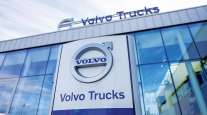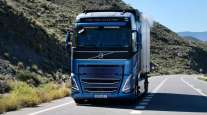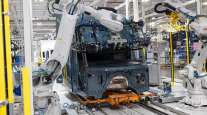Senior Reporter
Volvo Trucks Develops Autonomous Vehicle Called Vera

Volvo Trucks, the manufacturing arm of Volvo Group, underscored its commitment to offering autonomous commercial vehicles in the near future with the announcement recently that it has developed a self-driving, battery-electric, tractor-like unit it calls Vera.
Vera is low and sleek, has no space for a driver, and hooks up to a trailer using a fifth wheel and a kingpin.

Vera is low and sleek. (Volvo Truck Corp.)
Vera is intended to pull freight in ports, factory areas and large logistics centers where high volume loads are highly repetitive and cover short distances — but additional uses are possible. In the near future, Volvo Trucks’ transport solution will be further developed together with selected customers in prioritized applications, according to a company release.
The Gothenburg, Sweden-based truck maker is the second largest in the world, and its other technologies first developed in Europe have migrated to its U.S. brands. For example, its I-Shift automated manual transmission that now has 90% penetration at Volvo Trucks North America, and the platooning technology VTNA demonstrated in June in North Carolina with FedEx Corp.
Mack Trucks is Volvo Group's other North American brand. International subsidiaries include Renault Trucks and UD Trucks.

The operation is handled by autonomous electric vehicles linked to a cloud service and a transport control center. (Volvo Truck Corp.)
“The full potential of the transport industry is yet to be seen. Everything suggests that the global need for transportation will continue to significantly increase in the coming decade,” said Volvo Trucks President Claes Nilsson in a statement.
Growing world population and increasing urbanization are leading to significant challenges to solve environmental issues such as congestion, pollution and noise. Rising consumption, the fast growth of e-commerce and the widespread shortage of drivers put higher demands on efficient transport solutions, according to Volvo.
“If we are to meet this demand in a sustainable and efficient way, we must find new solutions. In order to secure a smoothly functioning goods-flow system we also need to exploit existing infrastructure better than currently,” Nilsson said. “The transport system we are developing can be an important complement to today’s solutions and can help meet many of the challenges faced by society, transport companies and transport buyers.”

Mikael Karlsson, vice president of autonomous solutions at Volvo Trucks. (Volvo Truck Corp.)
The autonomous electric vehicles will be linked to a cloud service and a transport control center, and equipped with sophisticated systems for autonomous driving — but Volvo did not immediately supply any specific details. They are designed to locate their current position to within centimeters, monitor in detail and analyze what is happening with other road users, such as at intersections, and then respond with high accuracy.
The transport control center will continuously monitor the progress of each Vera and monitor each vehicle’s position, the batteries’ charge, load content, service requirements and a number of other parameters.
Similar to an industrial production process, Vera’s speed and progress are tailored to avoid unnecessary waiting and to increase delivery precision. In this way Volvo believes it will be possible to minimize waste in the form of buffer stocks of trucks, and increase availability. Vehicles that operate on the same route also will cooperate to create optimal flow.
“Our system can be seen as an extension of the advanced logistics solutions that many industries already apply today. Since we use autonomous vehicles with no exhaust emissions and low noise, their operation can take place at any time of day or night,” said Mikael Karlsson, vice president of autonomous solutions at Volvo Trucks. “The solution utilizes existing road infrastructure and load carriers, making it easier to recoup costs and allowing for integration with existing operations.”




